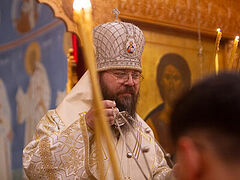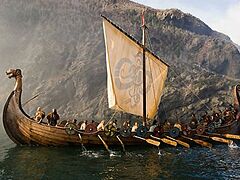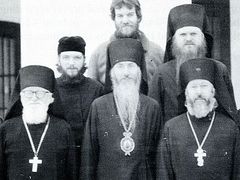Nun Amvrosia (Garayeva) was tonsured towards the end of the Soviet era, but she couldn’t have imagined that the Lord would send her to an ancient castle on a sea island in faraway Denmark to do her monastic labors. Today she performs her obediences at the Church of the Holy Royal Martyrs of Russia on the island of Bago, where a monastic community and a parish for Russian compatriots and Orthodox Danes have developed. Sister Ambrosia talks about life in Denmark through the eyes of a nun, the particulars of convent life, and the main spiritual challenges of our time.
—Please tell us how you were converted to the faith.
—From early childhood I was tormented by the question: “What is ‘I’?”. And when my grandmother passed away, another question was added: “Where has my grandmother’s ‘I’ gone?” The Lord brought me to the Pskov Caves Monastery (one of the two Orthodox monasteries active at that time on the territory of the RSFSR1). And there I received an answer.
—Such a profound one that you decided to become a nun?
—When I found the most important thing, everything else became unnecessary. When I heard that there were convents in the USSR, I couldn’t believe that I would be allowed to go there. To become a nun was not my own decision, but the absolutely undeserved favor of God to me. And in the Holy Trinity-St. Sergius Convent of Riga I was tonsured a nun.
—But here the main question arises: how did you move from the USSR to Denmark?
—After the celebration of the 1000th anniversary of the Baptism of Rus’ the process of the restoration of monasteries and churches in the RSFSR commenced. Like many other nuns of the Riga Holy Trinity-St. Sergius Convent, in 1990, the nun who later became Abbess Nikona (Peretyagina) and I were blessed to go to Russia, namely to Shamordino Convent. In November 2000, a citizen of Denmark, Mr. Jørgen Laursen Vig, came to the Department for External Church Relations with a request for someone to be sent to Denmark to set up a Russian Orthodox convent in his Hesbjerg Castle. As he wrote, “Only Orthodoxy is capable of preserving Christianity as such.” It was important for him to give his compatriots the opportunity to get acquainted with Orthodoxy. I was supposed to go to Denmark for a short while in order to prepare all the necessary documents. But the process dragged on, and now I’ve been in Denmark for over twenty years.
—God works in mysterious ways. What was your first impression of the country? Did you have culture shock? Tell us what (both then and today) caught your eye in terms of lifestyle, mentality, rules and social attitudes, and life in Denmark in general.
—There was no shock. That is primarily because in the first years I didn’t leave the castle area. And now I still communicate mainly with parishioners and locals, mostly of peasant origin. And these people are very kind and friendly. In general, much is being done in Denmark to create and maintain a benevolent environment, patriotism, and even collectivism in society, which can only be envied. In a sense, this makes us feel nostalgic for the USSR, where we were all taught many good things and were protected from the abominations that poured from the West onto our youth after perestroika. Moreover, the Danes are forced to be tolerant of the sexual minorities, who are imposing their rules here very aggressively. And in this sense, the Danes can only be pitied, since for most of them these new rules are disgusting and unacceptable—but local laws are not on their side. Many ordinary Danes are jealous of our newly adopted Russian laws. Outwardly, the country is very well-tended, and its people love their homeland and are proud of it. There are not many attractions here, but the Danes know how to make something interesting and attractive out of nothing. Ordinary people, especially in rural areas, are very kind and friendly. They, like us, cherish traditional values. But politicians, as in other Western countries, don’t protect the interests of their people—they impose laws that in the long run lead to the loss of Denmark’s identity and the reduction of its native population.
—Do you like living here? Do you have the desire to return to your homeland?
—It is nice to be in the environment I live in. But still, although I am here, I do not live here in the strict sense—I live in Russia. Here I perform obediences and serve God and Russia as best I can. At least twice a year for two months I am physically in Russia. And I hope the time will come when I won’t have to travel to a foreign country at all.
—How long has Orthodoxy existed in Denmark?
—The first Orthodox church was built in the city of Horsens under Catherine II for the relatives of the infant Tsar John whom she had sent to Denmark. But long before that, in the twelfth century, there had been an Orthodox Queen—Dagmar—in Denmark, in whose honor was named the Danish princess who became Tsar Alexander III’s wife, the Russian Empress Maria Feodorovna, the mother of the Holy Tsar-Martyr Nicholas.
—How many parishes are there in the diocese today? And how many Orthodox are here today and of which jurisdictions are they?
—There are three parishes of the ROC MP, two ROCOR parishes, one parish of the MP’s Patriarchal Exarchate of Western Europe, one parish of the Bulgarian Patriarchate, several Serbian and Romanian parishes, and two Ukrainian parishes (with the blessing of His Beatitude Metropolitan Onuphry). It is hard to say how many Orthodox Christians there are.
—Now let’s move on to the Church of the Holy Royal Martyrs. First, let’s talk about the history of its foundation.
—As I already said, it was set up on Jørgen Laursen Vig’s initiative. He once studied at the Sorbonne University, where he met Russian emigres of the first wave and became interested in our history, culture, religion; he came to the conclusion that Orthodoxy alone is capable of preserving Christianity as such. So he turned to the Moscow Patriarchate with a request to help build an Orthodox convent in Denmark.
—Is your community large today? Does it consist of Russians, or are there representatives of other nationalities, including locals, as well?
—The community is quite large: there are Russians, including immigrants from Ukraine, Serbs and Danes.
—Is there any pattern in the motivation of compatriot parishioners who moved to the country from Russia and other parts of the Russian-speaking world?
—These are mostly women who married Danes, and people from Ukraine who work on farms. Now there are refugees as well.
—Can you give us the most striking example of a conversion of one of the locals to Orthodoxy?
—One of our parishioners converted to Orthodoxy through icons. She started attending Orthodox icon-painting courses (they’re quite popular here) and through icons she felt that Orthodoxy really rightly glorifies God. So she joined the Church of Christ.
—What language do you worship in? Are there any peculiarities in the celebration of services? Perhaps some local traditions have developed?
—Services are celebrated in Church Slavonic and Danish. The patronal feast is the feast of the Holy Royal Martyrs, to whom our church is dedicated.
—Are your parishioners involved in the life of the community?
—Our parishioners help in everything. They recently replaced the roof. In the summer they work in the garden and the vegetable garden, mow the grass, stock in firewood, and so on.
—Do you do any educational, charitable or social projects?
—In the summer we have an Orthodox children’s camp.
—Tell us about the brightest events in the life of the parish over recent years (or over its history in general).
—This is not an event, but just a significant episode. When Vig was still alive, once I was alone in the church. And when I was reading the Six Psalms, two Danes (a son and a father) entered the church. I finished reading, went up to them and asked what they wanted. They replied: “Peace.” I continued the service, and then invited them to have a cup of tea. They told me how once by chance while on vacation in Greece they had dropped in at an Orthodox church and felt incredible peace and tranquility there. A few minutes later, a group of tourists from Japan entered the same church with cameras and their shameless (ape-like, as the Danes said) curiosity. The father and the son were indignant and about to leave, but it seemed as if someone was telling them from the altar, “No one and nothing can destroy this peace.” The peace they had lost immediately returned to them. Then they asked me about the history of our convent in Denmark and my acquaintance with Vig. I told them with a smile that Vig was unhappy that I didn’t want to do active missionary work. They responded, “You don’t need to do that! Your Orthodox Church is like a beautiful flower, which does not invite anyone to itself. It just exists, and all those who long for what is real come to enjoy its beauty and smell its fragrance. Just exist—there is nothing more you should do.” I agreed with them.
—Do you manage (if it’s necessary) to interact with representatives of non-Orthodox Christians and other faiths?
—Sometimes we go to faraway cities, where we celebrate services in Protestant churches for our Orthodox parishioners.
—How are relations with the State developing? Is there any support or, to the contrary, obstacles to the community’s activities?
—There are no obstacles so far. By the way, those who donate to our church account receive a tax deduction from the State.
—Why do you work?
—In the summer, together with pilgrims, I clean toilets on the pier. Why? Because I was asked to. Before we arrived on the island, there had been no one to do this (the other inhabitants of the island are too old), except for Christina, who has three farms, fields, parking spaces for renting yachts on the pier, and so on. She asked for help and we agreed. And this helped us fit into island life. But I don’t think that a priest, for example, should work. Of course, the Apostle Paul made a living through manual labor. But now you can’t earn money by making tents (which didn’t interfere with preaching), and I think it’s unreasonable and inappropriate for a parish to let its priest go to work for hire.
—What do you consider the challenge of the time for Orthodox Christians? And specifically in Denmark?
—Jesus Christ the same yesterday, and to day, and for ever (Heb. 13:8). I believe that for an Orthodox Christian the main challenge for all times is his sins.
—What is the main lesson you have learned over the years of your service?
—The main lesson was taught to me many, many years ago by the head of the then District State Motor Vehicle Inspectorate, who, on the orders of the head of the Regional State Motor Vehicle Inspectorate, returned my documents that had been unfairly taken away from me by a traffic policeman on the road. He said, referring to that traffic cop: “So you’ve complained about him to the authorities. But do you know how his health is? Do you know what’s going on in his family? You should pity people, mother.” I can’t love, but compassion is possible. I am very grateful to that man.
—What places would you advise a pilgrim or a traveler from Russia to visit in Denmark?
—When invited to go on a pilgrimage to Jerusalem, our convent’s father-confessor replied: “How can I get to the Heavenly Jerusalem?...” He hardly ever leaves the convent. If they ask me, I will answer: “If there is such a fortunate opportunity, stay at home, in Russia.”
—In conclusion, I will ask our traditional question. What words from the Holy Scriptures especially inspire and support you in difficult moments of your life?
—Seek ye first the Kingdom of God, and His righteousness; and all these things shall be added unto you (Mt. 6:33).








